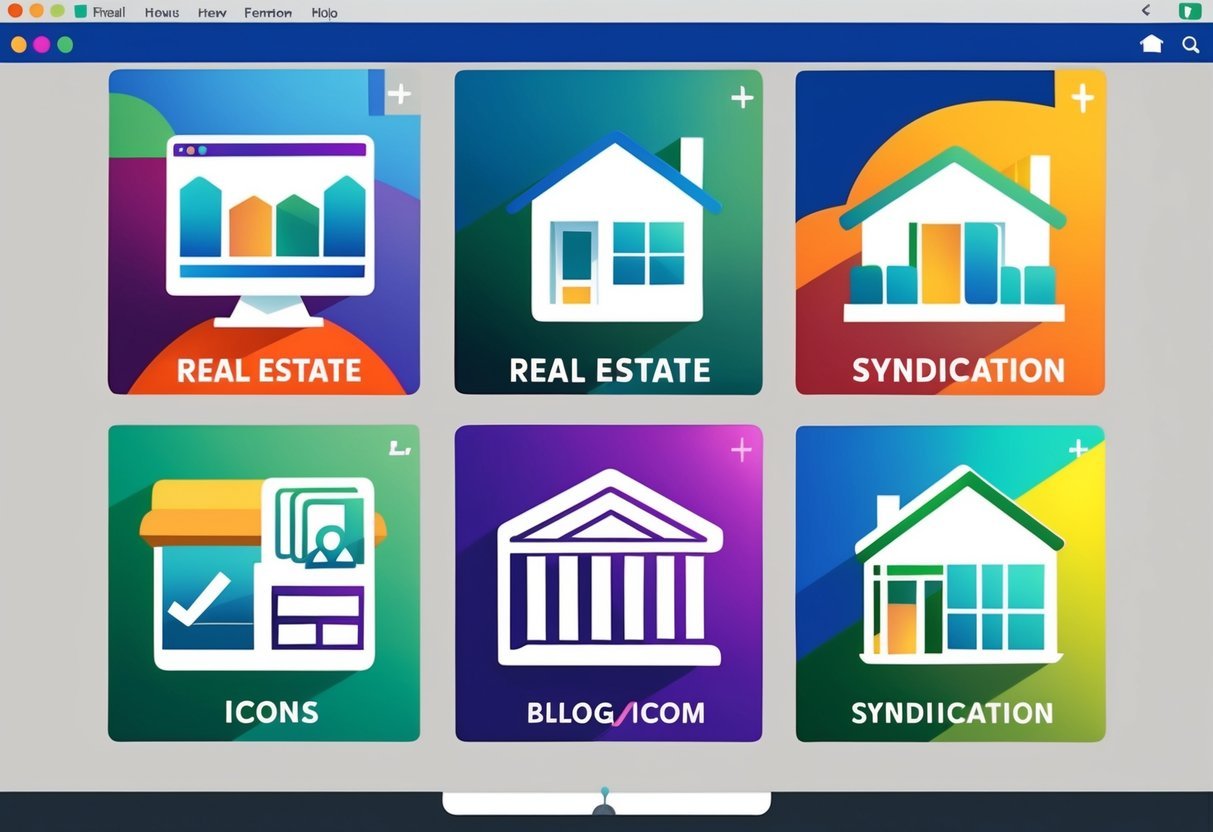Real estate syndication offers investors a unique opportunity to pool resources and participate in larger property deals.
This collaborative approach allows individuals to access high-value assets that may otherwise be out of reach.
By joining forces with other investors, you can potentially benefit from shared expertise, reduced risk, and increased returns.

Staying informed about the latest strategies and insights is crucial for success in real estate syndication. Blogs dedicated to this topic can provide valuable knowledge, tips, and case studies to help you navigate the complexities of syndication deals. Whether you’re new to syndication or looking to refine your approach, these online resources can be instrumental in expanding your understanding and improving your investment outcomes.
1) Real Wealth Network

Real Wealth Network offers valuable insights for those interested in real estate syndication.
Their blog provides a wealth of information to help you navigate this investment strategy.
You’ll find articles covering various aspects of real estate syndication on their platform.
These include tips on evaluating potential deals and understanding the legal aspects of syndication.
Real Wealth Network’s blog also discusses market trends and opportunities in different regions.
This can help you make informed decisions about where to invest your capital.
The platform offers guidance on passive investing through syndications.
You’ll learn how to assess the track record of syndicators and understand the potential risks and rewards.
Real Wealth Network provides information on different types of syndication deals, including single-family rental funds, multifamily properties, and industrial/self-storage assets.
This variety can help you diversify your investment portfolio.
You can expect to find practical advice on due diligence processes when considering a syndication opportunity.
The blog offers tips on reviewing offering documents and financial projections.
Real Wealth Network’s content is designed to educate both novice and experienced investors.
You’ll find articles explaining basic concepts as well as more advanced strategies for maximizing returns.
2) The Real Estate Guy’s Blog

The Real Estate Guy’s Blog offers a wealth of information for aspiring and experienced real estate syndicators.
You’ll find fresh insights on complex topics related to real estate investing and syndication strategies.
This blog covers essential legal concepts that every syndicator should understand.
You’ll learn about structuring deals, managing investor relationships, and navigating regulatory requirements.
The content is based on years of experience, as The Real Estate Guys™ Radio Show has been broadcasting since 1997.
Their extensive archive of over 300 episodes provides a rich resource for your syndication education.
You can expect practical advice on topics like raising capital, evaluating markets, and identifying profitable investment opportunities.
The blog also discusses emerging trends in real estate syndication.
By following this blog, you’ll gain valuable insights into becoming a successful real estate entrepreneur.
You’ll learn how to leverage syndication to scale your investments and create wealth through real estate.
Remember to check their podcast for additional content and in-depth discussions with industry experts.
The combination of written blog posts and audio content provides a comprehensive learning experience for real estate syndicators at all levels.
3) BiggerPockets
BiggerPockets stands out as a comprehensive resource for real estate investors, including those interested in syndication strategies.
You’ll find a wealth of information on their blog dedicated to real estate syndication.
The platform offers detailed guides that break down complex syndication concepts into digestible pieces.
You can learn about the roles of general partners and limited partners, as well as the legal and financial structures involved in syndication deals.
BiggerPockets’ forums are particularly valuable for connecting with experienced syndicators.
You can pose questions about successful syndication models and receive insights from professionals in the field.
The site also features podcasts and webinars that cover various aspects of real estate syndication.
These resources can help you stay updated on market trends and best practices.
You’ll discover articles discussing the pros and cons of syndication compared to other investment strategies.
This balanced approach allows you to make informed decisions about your investment path.
BiggerPockets provides tools and calculators to assist in analyzing potential syndication deals.
These resources can help you evaluate the financial viability of different investment opportunities.
By regularly engaging with BiggerPockets’ content, you can expand your knowledge and network within the real estate syndication community.
This continuous learning can be crucial for your success in the field.
4) Passive Income MD
Passive Income MD offers valuable insights into real estate syndications for aspiring investors.
You’ll find comprehensive guides that break down complex concepts into digestible information.
The blog covers essential topics like understanding investment terms and minimum investment requirements.
This knowledge helps you make informed decisions when evaluating potential opportunities.
You’ll learn about the roles and responsibilities of sponsors in syndication deals.
Understanding how sponsors oversee operations, provide updates, and manage property sales is crucial for your success as a passive investor.
Passive Income MD also explains accredited investor requirements for participating in most syndications.
This information helps you determine if you qualify and what steps you might need to take to become eligible.
The blog provides practical advice on conducting due diligence and assessing investment risks.
You’ll gain insights into evaluating expected returns, investment durations, and potential exit strategies.
By following Passive Income MD, you’ll develop a solid foundation in real estate syndication principles.
The blog’s clear explanations and actionable tips can help you navigate this lucrative investment strategy with confidence.
5) Joe Fairless Best Ever Real Estate Advice Blog

Joe Fairless, a prominent figure in commercial real estate investing, offers valuable insights through his Best Ever CRE Blog.
With years of experience under his belt, Fairless shares expert knowledge to help you navigate the complex world of real estate syndication.
The blog covers a wide range of topics relevant to your investment journey.
You’ll find articles on deal structuring, investor relations, and market trends that can enhance your syndication strategies.
Fairless’s background as a former advertiser turned real estate investor adds a unique perspective to his content.
His portfolio now includes over $1.9 billion worth of commercial real estate, giving weight to the advice he shares.
In addition to written content, you can tune into The Best Ever Show, Fairless’s long-running daily podcast.
This resource provides you with even more in-depth discussions on real estate investing topics.
The blog’s strength lies in its practical, actionable advice.
You’ll gain insights into risk management, property evaluation, and syndication deal structures that you can apply to your own investments.
By following Fairless’s blog, you’ll stay up-to-date with the latest trends and strategies in real estate syndication.
His experience and success in the field make this blog a valuable resource for both novice and experienced investors looking to refine their approach.
6) Investor Junkie

Investor Junkie offers valuable insights for those interested in real estate syndication strategies.
This blog provides comprehensive reviews of investment platforms and opportunities, helping you make informed decisions.
You’ll find detailed analyses of various real estate crowdfunding sites, comparing their features, returns, and risk levels.
These reviews can guide you in selecting the right platform for your investment goals.
The blog also covers essential topics like due diligence in real estate syndication.
You’ll learn how to evaluate potential deals, assess sponsor track records, and understand the fine print of investment agreements.
Investor Junkie regularly updates its content with current market trends and investment strategies.
This ensures you stay ahead of the curve in the ever-changing real estate landscape.
You’ll appreciate the blog’s focus on passive income strategies through real estate syndication.
It offers tips on diversifying your portfolio and maximizing returns while minimizing active involvement.
The content is presented in an easy-to-understand format, making complex financial concepts accessible to both novice and experienced investors.
You’ll find practical advice on topics like tax implications and exit strategies in real estate syndication deals.
7) REtipster

REtipster offers valuable insights for real estate investors seeking to expand their knowledge and strategies.
You’ll find a wealth of information on their blog covering various aspects of real estate investing.
The site focuses on providing practical advice that is easy to understand and apply.
You can expect to learn about tax strategies, market analysis, and other crucial topics for successful real estate investing.
REtipster’s content is particularly useful for those interested in land flipping.
Their articles delve into finding the best markets for land investing and offer tips to maximize your returns in this niche.
If you’re looking to diversify your real estate portfolio, REtipster also covers real estate syndication.
You’ll gain insights into this investment strategy and learn how to potentially benefit from larger, more lucrative deals.
The REtipster Forum provides an excellent platform for you to connect with other real estate enthusiasts.
You can ask questions, share experiences, and learn from fellow investors in a supportive community.
Understanding Real Estate Syndication

Real estate syndication allows multiple investors to pool resources for larger property acquisitions.
This investment strategy provides opportunities for both experienced and novice investors to participate in substantial real estate ventures.
Definition of Real Estate Syndication
Real estate syndication is a partnership between multiple investors who combine their capital to acquire, develop, or operate properties that would be challenging to purchase individually.
This investment vehicle is typically structured as a limited partnership or LLC.
Syndications enable you to invest in larger, potentially more profitable real estate projects without the burden of sole ownership.
You can diversify your portfolio and gain exposure to different property types and markets.
These investments are often passive, allowing you to benefit from real estate ownership without day-to-day management responsibilities.
This structure can be particularly appealing if you’re seeking hands-off investment opportunities.
Key Players in Syndication
In a real estate syndication, two primary groups of participants work together:
-
Sponsors (General Partners):
- Identify and acquire properties
- Manage the investment
- Handle day-to-day operations
- Make strategic decisions
-
Investors (Limited Partners):
- Provide capital for the investment
- Receive passive income and potential appreciation
- Have limited involvement in property management
The sponsor’s role is crucial, as they find the right property that meets investment criteria and has potential for good returns.
They also structure the deal, raise capital, and oversee the project’s execution.
As an investor, you’ll want to carefully evaluate the sponsor’s track record, experience, and alignment of interests before participating in a syndication.
Your due diligence is essential for making informed investment decisions.
Benefits of Real Estate Syndication

Real estate syndication offers investors several compelling advantages.
By pooling resources and expertise, you can access opportunities that might otherwise be out of reach.
Diversification
Syndication allows you to spread your investment across multiple properties and markets.
This diversification helps mitigate risk and potentially stabilize returns.
You can invest in different asset classes like multifamily, commercial, or industrial properties.
By participating in various syndication deals, you’re not putting all your eggs in one basket.
This strategy can protect your portfolio from localized market downturns or property-specific issues.
Syndication also enables you to invest in different geographic areas.
You might invest in growing markets across the country without the need to manage properties long-distance yourself.
Passive Income Potential
Real estate syndication offers a path to passive income without the hassles of direct property management.
As a limited partner, you can enjoy regular cash flow distributions without dealing with tenants, repairs, or day-to-day operations.
This hands-off approach allows you to benefit from real estate investments while maintaining your current lifestyle or career.
You receive income without the time commitment of being a landlord.
Syndications often target properties with strong cash flow potential, such as well-located multifamily buildings or stable commercial properties.
This focus can lead to consistent income streams for investors.
Access to Larger Properties
Syndication opens doors to institutional-quality assets that individual investors typically can’t afford on their own.
You can participate in the ownership of large apartment complexes, office buildings, or retail centers.
These larger properties often benefit from economies of scale, professional management, and value-add opportunities.
Such factors can potentially lead to higher returns and increased property appreciation over time.
By joining forces with other investors, you can tap into the expertise of experienced sponsors who have a track record of successfully managing substantial real estate projects.
This access to skill and experience can be invaluable in maximizing your investment’s potential.
Frequently Asked Questions

Real estate syndication involves pooling resources to invest in larger properties.
This investment strategy offers unique opportunities but also comes with specific considerations and challenges.
What are the risk factors associated with real estate syndication investments?
Real estate syndication investments carry market risk, property-specific risks, and sponsor-related risks.
Market conditions can affect property values and rental income.
Individual properties may face unexpected maintenance issues or local economic downturns.
The sponsor’s experience and track record are crucial, as poor management can impact returns.
How does real estate syndication differ from investing in REITs?
Real estate syndication offers direct ownership in specific properties, while REITs provide exposure to a portfolio of properties.
Syndications typically require higher minimum investments and longer hold periods.
You have more control and potential for higher returns in syndications, but REITs offer greater liquidity and diversification.
What are the typical structures of a real estate syndication deal?
Syndication deals often use limited partnerships (LPs) or limited liability companies (LLCs).
The sponsor acts as the general partner or managing member, while investors are limited partners or passive members. Profit splits vary but commonly follow an 80/20 or 70/30 structure after preferred returns.
How can an investor evaluate the best real estate syndication opportunities?
To evaluate syndication opportunities, review the sponsor’s track record and experience.
Analyze the property’s location, market trends, and financial projections.
Examine the deal structure, including fees, preferred returns, and profit splits.
Consider seeking advice from experienced investors or real estate blogs for insights.
What are the average returns currently observed in real estate syndication projects?
Returns vary widely depending on the property type, location, and market conditions.
Generally, syndications target internal rates of return (IRR) between 15% and 20%.
Cash-on-cash returns often range from 6% to 10% annually.
Remember that past performance doesn’t guarantee future results.
How can a beginner get started with real estate syndication and find a mentor?
You can start by educating yourself through reputable blogs like BiggerPockets or Passive Income MD.
Attend real estate networking events and join investment groups.
Consider partnering with experienced investors on smaller deals.
Seek out mentors through industry connections or professional organizations focused on real estate investing.

